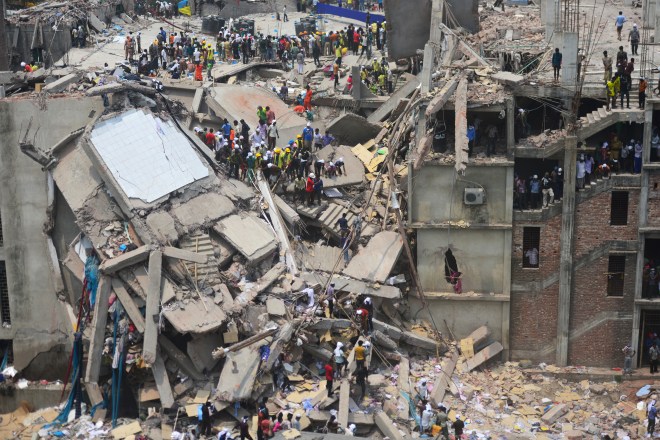Erik Loomis argues that the reason we don’t see more tragedies like West, Texas is because the US has outsourced industries to places like Bangladesh, where a decrepit, eight-story clothing factory collapsed this week, killing at least 218 people. Loomis wants our labor laws to apply abroad:
In my mind, this is the only way to fight the outsourcing epidemic that provides a cover for irresponsible corporate policies. The injured workers and the families of the dead deserve financial compensation. The American corporations who buy the clothes produced by this factory should be required to pay American rates of workers compensation. Ultimately, we need international standards for factory safety, guaranteed through an international agency that includes vigorous inspections and real financial punishments.
Yglesias pushes back, arguing that “it’s entirely appropriate for Bangladesh to have different—and, indeed, lower—workplace safety standards than the United States”:
Bangladesh is a lot poorer than the United States, and there are very good reasons for Bangladeshi people to make different choices in this regard than Americans. That’s true whether you’re talking about an individual calculus or a collective calculus. Safety rules that are appropriate for the United States would be unnecessarily immiserating in much poorer Bangladesh. Rules that are appropriate in Bangladesh would be far too flimsy for the richer and more risk-averse United States. Split the difference and you’ll get rules that are appropriate for nobody. The current system of letting different countries have different rules is working fine. American jobs have gotten much safer over the past 20 years, and Bangladesh has gotten a lot richer.
Kimberly Ann Elliott sees the situation differently:
[C]ore standards like freedom of association, nondiscrimination, child labor, or forced labor are both fundamental rights, and they’re also framework rights in terms of having a well-functioning rule of law system in place for your economy. Those rights they can vary in the details but, and this is what the 1998 ILO declaration said, all countries, regardless of level of development, should respect these core rights.
Then you have all these other standards like health and safety, like wages, that will necessarily differ by a country’s level of development and, as Matt Yglesias says, by their choices. I wouldn’t go so far as Yglesias to say that therefore it’s only up to them. In a lot of these cases the workers aren’t making a fully informed choice to take these risks. They don’t know the chemicals are toxic. They don’t know that the building’s unsafe.
(Photo: Bangladeshi volunteers and rescue workers assist in rescue operations after an eight-storey building collapsed in Savar, on the outskirts of Dhaka, on April 25, 2013. Survivors cried out to rescuers April 25 from the rubble of a block of garment factories in Bangladesh that collapsed killing 175 people, sparking criticism of their Western clients. By Munir uz Zaman/AFP/Getty Images)
